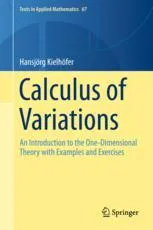Calculus of Variations: An Introduction to the One-Dimensional Theory with Examples and Exercises
4.5
Reviews from our users

You Can Ask your questions from this book's AI after Login
Each download or ask from book AI costs 2 points. To earn more free points, please visit the Points Guide Page and complete some valuable actions.کتاب های مرتبط:
Welcome to "Calculus of Variations: An Introduction to the One-Dimensional Theory with Examples and Exercises", a comprehensive and approachable exploration of one of the most elegant branches of mathematics. This book serves as a foundational text that delves into the one-dimensional theory of the calculus of variations, offering readers a clear understanding of the subject through carefully crafted examples, exercises, and explanations. Whether you are a student, instructor, or a math enthusiast, this book is designed to both inspire and educate, blending theory with practice in an accessible yet rigorous manner.
Detailed Summary of the Book
The calculus of variations is a fascinating mathematical discipline that studies how to optimize functionals — that is, mappings from functions to real numbers. In this book, our focus is restricted to the one-dimensional case, which forms the essential building block for understanding the broader, higher-dimensional problems in this field. This text introduces the reader to fundamental concepts such as the variational principle, Euler-Lagrange equations, boundary conditions, and necessary and sufficient conditions for optimization. Furthermore, it bridges the abstract theory with concrete applications, demonstrating how calculus of variations is used to solve real-world problems.
The book is thoughtfully structured to progress from basic principles to more advanced topics, making it suitable for readers with varying levels of prior knowledge. The chapters include numerous step-by-step examples to clarify challenging concepts, as well as carefully designed exercises to enhance understanding and foster deeper insights. The discussions strike a balance between mathematical rigor and intuitive reasoning, ensuring that the content remains engaging and widely accessible even to those encountering the subject for the first time.
As such, Calculus of Variations is not only a textbook but also a tool for self-study and exploration. The aim is to provide readers with the foundational skills to tackle both theoretical questions and practical problems arising in fields like physics, engineering, and economics, where optimization principles are key.
Key Takeaways
- An in-depth introduction to the basic principles of the calculus of variations, especially in one-dimensional problems.
- A rigorous treatment of the Euler-Lagrange equation, boundary conditions, and transversality conditions, connecting theory to practice.
- Multiple examples and exercises designed to build conceptual understanding and problem-solving skills.
- A pathway to understanding the applications of the calculus of variations in physics, engineering, and economics.
- A logical progression from fundamental theories to advanced applications, suitable for both beginners and those seeking a refresher.
Famous Quotes from the Book
"The calculus of variations lies at the crossroads of mathematics, physics, and engineering, offering a unique lens through which to view optimization problems."
"In mathematics, as in life, the search for an optimal solution often reveals deeper principles governing the underlying system."
Why This Book Matters
The calculus of variations has profound implications across numerous disciplines. Whether it's determining the shortest path between two points, optimizing the shape of a physical system, or deriving equations in theoretical physics, the methods introduced in this book form the cornerstone of modern applied mathematics. By focusing on the one-dimensional case, this text provides readers with a strong foundational framework while preparing them to explore broader and more complex variations in higher dimensions.
What sets this book apart is its clarity, emphasis on practical examples, and the inclusion of challenging yet approachable exercises. These features make the material both instructive and enjoyable, encouraging readers to engage deeply with the subject. Moreover, the calculus of variations is a subject of enduring relevance—its applications can be seen today in cutting-edge research areas ranging from machine learning to quantum mechanics. Understanding these methods not only enhances mathematical proficiency but also opens doors to a deeper comprehension of the natural and technological world.
This book belongs on the shelf of anyone eager to explore the beauty and utility of mathematical optimization. It is a resource that combines intellectual rigor with intuitive explanations, making the calculus of variations both tangible and inspiring.
Free Direct Download
You Can Download this book after Login
Accessing books through legal platforms and public libraries not only supports the rights of authors and publishers but also contributes to the sustainability of reading culture. Before downloading, please take a moment to consider these options.
Find this book on other platforms:
WorldCat helps you find books in libraries worldwide.
See ratings, reviews, and discussions on Goodreads.
Find and buy rare or used books on AbeBooks.
1385
بازدید4.5
امتیاز0
نظر98%
رضایتReviews:
4.5
Based on 0 users review
Questions & Answers
Ask questions about this book or help others by answering
No questions yet. Be the first to ask!





![The Ultimate iOS Interview Playbook: Conquer Swift, frameworks, design patterns, and app architecture [Team-IRA]](https://s3.refhub.ir/images/thumb/The_Ultimate_iOS_Interview_Playbook__Conquer__29925.webp)







